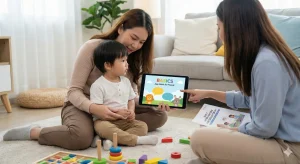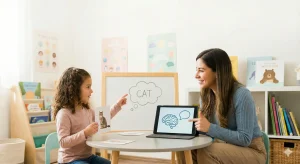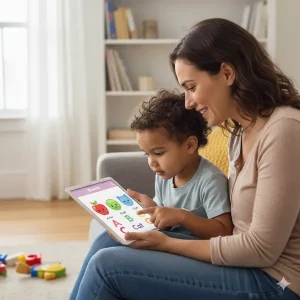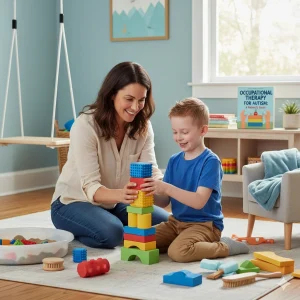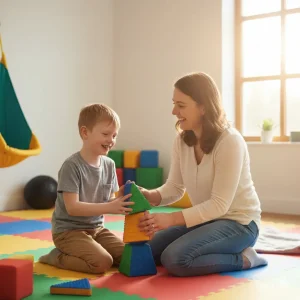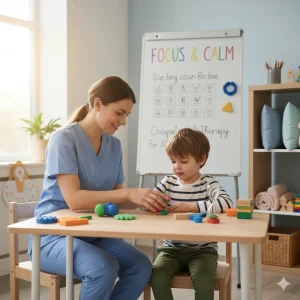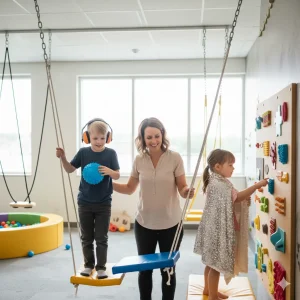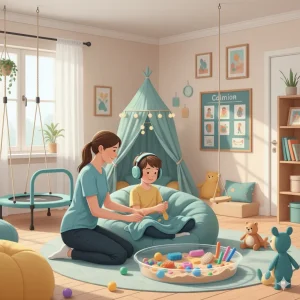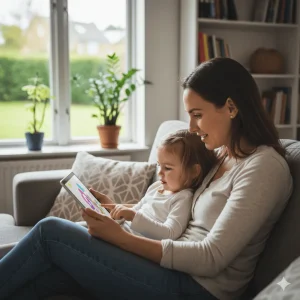Why BASICS is the Perfect App for Preschool and Kindergarten Readiness
By Wellness Hub
Last Updated: October 18, 2025
Preparing your child for preschool or kindergarten can feel like walking a tightrope between fun and foundation. You want them to recognize letters, follow directions, and stay curious—without turning learning into a chore. The truth is, school readiness isn’t about memorizing numbers or tracing worksheets; it’s about helping your child think, listen, communicate, and explore the world with confidence.
That’s exactly where BASICS, an early learning app designed by child development experts, shines. Built for ages 2–6, it transforms everyday play into structured, purposeful learning. Through colorful games, familiar words, and real-life concepts, children practice the very skills teachers look for in the classroom—attention, vocabulary, problem-solving, and emotional awareness—long before they step into school.
In this article, you’ll discover why BASICS is the perfect app for preschool and kindergarten readiness—how it turns curiosity into learning, strengthens foundational skills, and helps your child transition smoothly from home to the classroom.
Free Speech Help for Kids
Concerned about speech delays? Book a free consultation with our expert speech therapist and get guidance tailored to your child’s needs.
Understanding School Readiness in Early Childhood
What Preschool Readiness Really Means
When parents hear the term school readiness, many think of knowing the alphabet or counting to ten. But true early childhood readiness goes far beyond memorizing letters and numbers. It’s about developing the core skills that help a child adapt, communicate, and learn in a structured environment.
Preschool readiness means your child can listen to instructions, express basic needs, engage in simple conversations, and follow routines with minimal help. It includes emotional maturity—such as taking turns, waiting patiently, and adjusting to new situations. These abilities create a foundation for confidence and curiosity in the classroom.
By focusing on these deeper skills, parents can ensure their child enters preschool prepared not just academically but socially and emotionally. Apps like BASICS strengthen these readiness areas through structured play—helping children practice communication, matching, memory, and reasoning in fun, age-appropriate ways.
Key Domains of Readiness — Language, Thinking, Self-Help, and Social Skills
Every child’s journey toward kindergarten readiness involves four interconnected domains—language, thinking, self-help, and social skills.
- Language Development: Children who can understand and express words clearly find it easier to follow classroom directions and communicate with peers. Activities like naming objects, identifying actions, and answering questions build early comprehension.
- Thinking & Problem-Solving: Preschoolers use reasoning and memory to recognize patterns, compare objects, and solve simple challenges. Early cognitive games lay the groundwork for subjects like math and science.
- Self-Help Skills: Independence grows when children can dress themselves, organize materials, or manage simple routines. These tasks teach responsibility and boost confidence.
- Social & Emotional Growth: Sharing, cooperating, and managing emotions are vital for healthy peer interaction. Structured play, storytelling, and group games nurture empathy and teamwork.
A strong kindergarten skills checklist doesn’t just cover numbers and letters—it includes how well a child communicates, pays attention, and interacts with others. BASICS helps strengthen each of these domains through visual prompts, speech practice, and real-life scenarios that make learning relatable.
Why Ages 2–6 Are the Foundation Years for Lifelong Learning
The years between ages 2 to 6 are often called the foundation years—a critical window for brain growth and skill acquisition. During this stage, children’s brains form neural connections rapidly, allowing them to absorb language, concepts, and behaviors at an extraordinary pace.
Introducing structured play and guided learning during this time shapes not just academic ability but emotional and cognitive growth. Children learn how to concentrate, plan, remember, and respond to instructions—all of which are essential for later success in school and beyond.
Early interventions through interactive learning platforms like BASICS provide children with opportunities to explore matching, memory, and pre-math concepts in a fun, engaging format. These activities don’t just teach facts—they strengthen focus, reasoning, and communication, setting the stage for lifelong learning.
The Role of Play-Based Learning in Building Readiness
Preschool and kindergarten readiness begin long before children sit at a classroom desk. For young learners, play is the most natural and effective form of learning. Play-based learning turns everyday activities into opportunities to think, communicate, and solve problems. Instead of memorizing letters or numbers, children in the early years learn best when they explore, imagine, and interact — exactly the approach followed in the BASICS App.
Through thoughtfully designed early learning activities, the app helps children build attention, curiosity, and social connection — all key ingredients for school success. Let’s see how play-based learning lays the groundwork for lasting growth.
How Interactive Play Supports Focus, Memory, and Confidence
Interactive play keeps children engaged because it combines fun with purpose. When a child taps, matches, or listens in a game, they’re not just passing time — they’re practicing attention and working memory. Every time they remember where an image appeared or recall the name of an object, their brain strengthens the pathways used for concentration and recall.
In BASICS App, activities like matching pairs, sorting colors, or identifying sounds help children stay attentive for longer periods without pressure. Each success, no matter how small, builds confidence and motivates them to keep exploring. This gentle progression — from easy tasks to more complex ones — mirrors how children naturally learn through play.
Why Games Are Better Than Rote Drills for Preschoolers
Traditional drills often rely on repetition without meaning — asking children to recall or write something again and again. For preschoolers, this can feel mechanical and quickly drain motivation. In contrast, play-based games create context and make learning emotionally rewarding.
When a child completes a puzzle, sorts animals, or chooses the right picture after hearing a word, they’re applying knowledge — not memorizing it. This practical use of language and reasoning helps the information stick.
The BASICS App applies this approach by transforming structured learning into mini-games that feel like playtime. These experiences help children develop early literacy and numeracy naturally while promoting independence and joy in learning.
Examples of Cognitive and Social Skills Built Through Guided Play
Play-based learning doesn’t just teach facts — it shapes how children think, communicate, and connect. Guided activities such as sorting, matching, or role-based games encourage both cognitive and social growth.
- Cognitive Skills: Problem-solving, sequencing, reasoning, and memory improve when children solve puzzles or match related objects.
- Language Skills: Naming items, describing actions, and answering simple questions build expressive and receptive language.
- Social Skills: Taking turns, following rules, and celebrating small wins encourage cooperation and empathy.
- Emotional Development: Positive feedback and playful repetition help children manage frustration and persist with challenges.
Through these guided experiences, children gain a balanced foundation for learning — one that supports both academic readiness and emotional confidence.
How BASICS App Builds Preschool Readiness Step by Step
BASICS App follows a clear, structured learning path designed by therapists to help children aged 2–6 build preschool and kindergarten readiness skills through play.
Each level targets language, reasoning, and early academic foundations in small, achievable steps.
Table: Levels That Build School Readiness in BASICS App
| Level Name | Key Focus Areas | Skills Developed | Ideal Age Group |
|---|---|---|---|
| Foundation Forest | Matching, memory, sounds, early reasoning | Improves focus, visual discrimination, and problem-solving | 2–4 years |
| Vocabulary Valley | Naming objects, learning categories | Builds receptive & expressive vocabulary, comprehension | 3–5 years |
| Phrase Park | Two- and three-word phrases, grammar basics | Encourages sentence building, communication, and fluency | 3–5 years |
| Pre-Math Concepts | Size, color, shape, and quantity | Strengthens comparison, sorting, and pre-number reasoning | 3–5 years |
| Inquiry Island | “What” and “Where” question practice | Builds understanding, reasoning, and social communication | 4–6 years |
Foundation Forest – Matching, Memory, and Early Reasoning
Foundation Forest introduces the earliest cognitive and visual skills children need for school readiness.
Through matching, sound recognition, and memory games, children learn to notice patterns, remember sequences, and make simple connections. These early learning app features promote attention span, observation, and reasoning — all key to classroom participation. Matching identical items or completing missing halves also supports speech and language growth, as children describe what they see (“two apples,” “same color”).
Vocabulary Valley – Learning Everyday Words and Categories
Vocabulary Valley helps children learn to name objects, people, and actions, expanding both understanding and expression. Kids explore familiar categories — animals, food, toys, and home items — improving word recall and comprehension through interactive play.
These sets strengthen receptive and expressive vocabulary, helping children link pictures with spoken words. The structured progression mirrors what speech therapists teach in early sessions, making BASICS an effective speech therapy app for home or classroom use.
Phrase Park – Combining Words into Short Phrases
Phrase Park bridges the gap between single words and full sentences.
Children practice forming two- and three-word phrases like “eat apple” or “big ball,” learning natural word order and basic grammar. By using visuals and audio prompts, BASICS makes sentence formation intuitive, helping children communicate needs, describe actions, and share thoughts — core school readiness activities. Therapists often recommend these tasks for children developing early speech or recovering from speech delay or autism-related language challenges.
Pre-Math Concepts – Learning Size, Color, Shape, and Quantity
Pre-Math Concepts prepare children for future math success by introducing comparisons, sorting, and measurement words. Activities like big vs small, long vs short, more vs less, and match the color help kids grasp foundational math vocabulary. These interactive visual games strengthen both language comprehension and analytical thinking, as children explain what they observe (“the tower is taller,” “three red balls”). This early reasoning builds confidence and curiosity — essential traits for kindergarten learners.
Inquiry Island – Answering “What” and “Where” Questions
Inquiry Island develops comprehension through question-based play. Children learn to answer “What is this?” and “Where is the ball?”—activities that strengthen reasoning, observation, and verbal response.
Practicing WH questions supports early academic communication, helping children follow classroom directions, describe objects, and express understanding. This level is especially valuable for children with speech delay or autism, as it encourages joint attention and functional communication through repetition and visual cues.
Language, Thinking, and Social Foundations in BASICS App
Preschool and kindergarten readiness isn’t only about learning numbers or alphabets—it’s about building the core language, thinking, and social foundations that shape how a child learns and communicates. The BASICS App is designed to strengthen these essential skills through structured play, visuals, and interaction, giving young learners the foundation they need to thrive in school and daily life.
Building Vocabulary and Comprehension Through Visuals
Children learn best when language connects to what they see and experience. The BASICS App uses vivid illustrations, real-life pictures, and interactive animations to help children understand and remember new words.
Activities in levels like Word Wonders and Vocabulary Valley expose children to everyday objects—animals, foods, toys, and actions—so they can associate spoken words with clear visuals.
This visual-based learning approach builds both receptive language (understanding words) and expressive language (using words to communicate). As children tap, match, and listen to instructions, they naturally develop comprehension and the ability to describe what they see.
By hearing and responding to prompts like “Tap the red ball” or “Show me who is eating,” kids strengthen early communication skills and learn to listen, process, and respond meaningfully—an ability that forms the heart of classroom learning.
Developing Problem-Solving and Logical Thinking
Beyond words, school success depends on a child’s ability to think, reason, and make sense of patterns. BASICS app builds cognitive development through carefully sequenced games that challenge children to observe, compare, and decide.
In levels like Foundation Forest and Inquiry Island, kids match objects, identify differences, complete patterns, and answer “What” or “Where” questions—activities that strengthen attention and reasoning step by step.
Each interactive task encourages children to analyze situations visually and linguistically. For example, when they’re asked “Which one doesn’t belong?” or “Where is the toy car?”, they must recall previous information, apply logic, and choose the correct response.
This blend of visual reasoning and language-based thinking helps children link what they see to what they know, laying a strong foundation for problem-solving in reading, math, and real-world decision-making.
Encouraging Attention, Patience, and Cooperation
Sustained attention and social awareness are vital classroom skills—and BASICS nurtures both through engaging, goal-oriented play.
Each activity is short, structured, and designed to capture focus without overwhelming the child. Tasks gradually increase in difficulty, helping children build attention span and patience through achievement rather than pressure.
Group-inspired tasks in BASICS App, such as conversation prompts or matching activities involving people and emotions, also promote social communication and cooperation. By taking turns, waiting for visual cues, and celebrating progress, children learn self-regulation and teamwork—key aspects of social readiness.
Parents often notice improvements beyond the screen: children who practice regularly with BASICS become more attentive listeners, follow instructions better, and respond calmly to guidance. These are the same behaviors that help them adapt confidently in a preschool or kindergarten setting.
Bridging Home Learning and Classroom Skills
Preschool and kindergarten readiness isn’t just about knowing letters or numbers — it’s about learning how to learn. The BASICS App bridges the gap between home learning and classroom skills by helping children practice focus, participation, and communication in everyday settings. Through interactive, structured play, it creates a smooth transition from familiar routines at home to new experiences in school.
How BASICS App Mirrors Preschool Routines (Listening, Responding, Turn-Taking)
Inside the BASICS App, every activity reflects the rhythm of a preschool classroom. Children learn to listen carefully, follow directions, and respond appropriately—skills that teachers emphasize daily. Games like Matching, Inquiry Island, and Conversation Circles encourage kids to wait for prompts, take turns tapping answers, and listen for verbal cues.
This kind of guided interaction mirrors circle-time discussions, show-and-tell, and story sessions in preschools. By repeating short, focused activities, children build attention span and patience—making the shift to structured classroom routines smoother and less overwhelming.
Parents as Co-Teachers — Supporting Everyday Learning Through BASICS App
The BASICS App is designed to make parents active partners in their child’s early education. Through parent-child learning, families can turn short play sessions into meaningful lessons—without extra preparation or materials.
Each goal in the app provides visual and verbal guidance, so parents can model responses, encourage imitation, and celebrate effort. For example, when a child names a color or answers a “what” question, parents can expand it into a short conversation—just like a teacher would. These everyday interactions build comfort with listening, speaking, and turn-taking in natural contexts.
By practicing together, parents reinforce the same communication and thinking patterns children will use in classrooms, promoting both confidence and consistency.
Transitioning From Home Learning to Formal Schooling With Confidence
The BASICS App prepares children for more than just academics—it nurtures the emotional and behavioral readiness that school demands. Children learn to follow multi-step instructions, wait for feedback, and express their needs clearly, all of which reduce anxiety when starting preschool.
Because the app integrates real-life themes—like routines, greetings, and cooperation—children begin school with a sense of familiarity. They already know how to listen, respond, and stay engaged during learning time. This makes the first days of school easier and helps teachers see immediate participation.
By bridging home learning and classroom readiness, BASICS App builds the foundation for confident learners—children who are curious, focused, and prepared to thrive in both structured and playful environments.
Real-Life Skills Your Child Gains Through BASICS App
Preschool and kindergarten readiness goes far beyond memorizing letters or numbers. It’s about developing real-life learning for kids — the ability to understand, communicate, and apply concepts in daily routines. The BASICS App helps children practice these foundational life skills through interactive games, visuals, and everyday themes, nurturing both communication readiness and confidence.
Each activity in BASICS is designed to bridge the gap between play and purpose — ensuring that children not only learn concepts but also know how to use them in real-world situations.
Understanding Instructions and Following Directions
Following directions is one of the most essential school readiness skills. In BASICS, children learn to listen, process, and respond through guided prompts such as “Tap the red ball” or “Find the biggest animal.” These interactive exercises strengthen listening comprehension, attention span, and sequencing — the ability to understand what comes first, next, and last.
By practicing step-by-step activities, children become better at following teacher instructions in classrooms and daily routines at home. This builds the foundation for communication readiness and cooperative learning in group settings.
Recognizing Colors, Shapes, Days, and Routines
Understanding colors, shapes, and daily patterns helps children describe and organize the world around them. BASICS uses vibrant visuals, audio cues, and repetition to help kids recognize color names, identify shapes, and associate them with objects they see every day.
Through pre-math skills like comparing shapes or grouping items by color, children strengthen both visual perception and categorization — early signs of logical thinking. Activities covering days of the week and familiar routines (like brushing teeth or going to school) help children predict, plan, and talk about their daily life more confidently.
Early Number Sense — Counting and Comparing Objects
In BASICS, math learning begins with meaning, not memorization. Children start by counting real-world objects such as fruits, toys, or animals, connecting numbers to quantity in a way that feels natural and visual.
Activities like “How many apples?” or “Which basket has more?” introduce pre-math skills through everyday play. These interactive games promote number sense — understanding that numbers represent amounts and that quantities can be compared, added, or reduced.
By using clear visuals and guided audio, BASICS helps children grasp math concepts they can apply in real life, such as sharing items or recognizing “more” and “less” in everyday situations.
Emotional and Social Growth Through Conversation Cards
Social confidence and emotional understanding are just as important as academic readiness. BASICS includes Conversation Circles and Emotions Explorer, where children identify feelings, talk about daily events, and respond to simple social questions like “How do you feel when you play?”
These short, visual conversation prompts encourage children to take turns, listen to others, and express emotions with words instead of behaviors. As they practice greetings, polite responses, and situational awareness, they build strong social communication and emotional readiness — crucial for preschool participation and forming friendships.
Making Learning Consistent and Stress-Free
Preschool readiness grows best in a calm, predictable environment—one where learning feels like play instead of pressure. The BASICS App makes that possible by combining learning consistency, visual learning tools, and structured milestones for preschool children. Each feature helps parents maintain daily practice without overwhelming their child, ensuring that every session feels engaging and achievable.
Goal Mode – Structured Progress for Preschool Milestones
Goal Mode in BASICS App transforms early learning into a clear, step-by-step journey. Each goal—such as Early Learning Skills, Core Language Skills, or Pre-Math Concepts—is broken into small, attainable milestones that guide parents and children through a structured path.
As your child completes matching, vocabulary, or sentence-building tasks, BASICS tracks progress automatically, showing how skills evolve over time. This structured milestone approach gives families a sense of direction and purpose. Instead of guessing what to teach next, parents can simply follow the visual progress bar and know their child is on the right developmental track.
Library Mode – Flexible Learning Based on Interests
While structure is vital, flexibility keeps motivation alive. Library Mode lets families explore all BASICS activities freely, based on their child’s curiosity and interests. A child fascinated by animals can spend extra time in Word Wonders or Vocabulary Valley, while another who loves colors can revisit Pre-Math and Colors & Shapes sets.
This freedom ensures that practice never feels forced. Parents can mix focused skill-building from Goal Mode with open exploration from Library Mode, creating a balance between learning consistency and personal choice. Over time, this balance nurtures independence, self-paced learning, and long-term engagement—key components of school readiness.
Motivation Through Visual Rewards and Completion Feedback
Children thrive on encouragement, and BASICS uses visual learning tools to make motivation visible. Every time a child completes an activity, colorful animations, stars, and cheerful sounds celebrate progress. The app’s visual feedback helps kids connect effort with success—an essential step in developing perseverance and confidence.
Parents can view completion reports and share praise, reinforcing consistency at home. These small but meaningful rewards turn routine practice into an exciting challenge, helping children look forward to their “BASICS time” each day.
Why BASICS App Fits Every Learning Style
Every child learns differently — some understand better by seeing, others by listening, and many by doing. The BASICS app is built around this principle, offering a truly personalized learning experience that adapts to your child’s unique strengths. Whether your little one is a visual explorer, an active learner, or a listener who absorbs language through sound, BASICS provides an environment where learning feels natural and enjoyable.
Visual, Auditory, and Kinesthetic Engagement
BASICS is designed to reach children through multiple learning pathways.
- Visual learners benefit from colorful illustrations, video modeling, and interactive story scenes that make abstract ideas easy to grasp.
- Auditory learners engage through clear voice prompts, repetition, and feedback that reinforce listening comprehension and speech.
- Kinesthetic learners stay involved through tap-and-respond games that combine movement with attention — transforming play into progress.
This multisensory design ensures that children stay motivated, attentive, and emotionally connected to the learning process — a key factor in early speech and cognitive growth.
Adaptable Pace for Different Developmental Needs
Every child develops at their own rhythm. BASICS App offers adaptive learning for kids, allowing parents and therapists to adjust levels, topics, and difficulty. Whether your child is just starting to match pictures or already forming sentences, the app gently increases complexity without creating frustration.
Each activity can be replayed, skipped, or personalized based on progress. This flexibility helps children with different attention spans, speech delays, or developmental challenges continue learning comfortably. The personalized learning app structure in BASICS helps children master skills at their own pace, ensuring steady growth and confidence in every session.
Designed by Therapists for Holistic Readiness
Unlike generic learning apps, BASICS is a therapist-designed program developed by speech and occupational therapists who understand child development. Every activity aligns with real school-readiness goals — building attention, communication, fine motor control, and early problem-solving skills together.
The app’s structure blends therapist-designed activities with engaging visuals and clear voice guidance, ensuring each child practices essential skills while having fun. This evidence-based approach transforms BASICS into more than a speech therapy app — it’s a holistic learning platform that nurtures the mind, body, and emotions of young learners.
Key Takeaways for Parents
Preschool readiness isn’t about memorization—it’s about communication, curiosity, and confidence
Preparing your child for preschool or kindergarten goes far beyond memorizing alphabets or counting numbers. True school readiness comes from helping children express themselves, explore their surroundings, and engage meaningfully with others. When your child practices communication skills, learns to ask and answer questions, and follows simple instructions, they build the foundation for confident participation in a classroom setting.
Encouraging curiosity through play helps develop attention, reasoning, and problem-solving—core parts of early childhood development. Instead of focusing on drills, activities that involve matching, sorting, identifying colors, and naming objects make learning natural and enjoyable. These playful interactions prepare children for structured learning while strengthening both their language and cognitive skills.
BASICS combines speech, cognition, and play into one learning journey
The BASICS app brings together all the essential areas of preschool learning—speech development, cognitive growth, and interactive play—within a single, structured platform. Each level of BASICS, from Foundation Forest to Inquiry Island, is designed by therapists to gradually build a child’s focus, memory, language, and pre-math skills.
Children learn through visual prompts, sounds, and engaging activities that strengthen both receptive and expressive language. This approach ensures that every moment of screen time contributes to real learning outcomes—helping your child listen better, think independently, and communicate with confidence.
By blending speech therapy principles with early learning goals, BASICS transforms everyday play into a guided path toward school readiness and lifelong curiosity.
Conclusion
Wrap up by reinforcing that preschool readiness is best nurtured through play, curiosity, and interaction—not rote drills. BASICS App supports this natural process by blending language, reasoning, and pre-academic skills within a joyful learning environment. Encourage parents to explore the app as part of their child’s daily learning routine, promoting confidence, independence, and smoother transitions into school.
About Wellness Hub
Wellness Hub is a trusted digital platform that empowers parents, caregivers, and professionals with science-backed tools for childhood development. From online speech therapy to home therapy resources, we offer a holistic ecosystem for children facing speech delays, autism, ADHD, and other developmental challenges.
Rooted in evidence-based practices and delivered by certified experts, Wellness Hub bridges the gap between accessibility and quality care. Whether you need at-home speech strategies, developmental checklists, or interactive mobile apps like BASICS App, we make early intervention affordable and family-friendly.
Start your journey today with expert guidance tailored to your child’s unique communication and learning needs—anytime, anywhere.
Frequently Asked Questions
1. What skills should a preschool-ready child have?
A preschool-ready child can follow simple instructions, recognize common objects, understand basic concepts like colors and shapes, and express needs using short phrases. Early social skills such as taking turns and sharing also indicate readiness. BASICS supports these abilities through playful matching, vocabulary, and conversation activities.
2. How does BASICS App differ from typical preschool worksheets?
Unlike static worksheets, BASICS uses interactive visuals, sounds, and play-based tasks that engage multiple senses. Children learn by exploring, tapping, and responding, which strengthens both attention and understanding. This hands-on approach mirrors how kids learn best—through active play rather than repetition alone.
3. Can BASICS App replace preschool teaching?
BASICS isn’t a replacement for preschool—it’s a complement. It reinforces early learning concepts like language, reasoning, and pre-math skills at home. The app helps parents provide consistent, structured practice between school or therapy sessions, supporting overall school readiness.
4. How much time should my child spend on BASICS App daily?
For preschool-age children, 15–20 minutes of guided play per day is ideal. Short, consistent sessions improve focus and retention without overstimulation. Parents can extend time naturally through daily routines or story discussions related to what was learned in the app.
5. What age group benefits most from BASICS App for school readiness?
BASICS is designed for children aged 2–6 years, covering the preschool and kindergarten stages. Foundation levels focus on toddlers (2–4 years), while higher levels—like Phrase Park and Pre-Math Concepts—prepare 4–6-year-olds for academic learning.
6. How does BASICS App build school readiness through play?
Every BASICS activity combines play with skill-building—matching games for focus, vocabulary for communication, and pre-math for logic. By turning educational goals into interactive games, children learn naturally while staying motivated and confident.
7. What makes BASICS App effective for early learners?
BASICS follows a structured, therapist-designed progression from matching and memory to vocabulary, sentences, and reasoning. Each level builds on previous skills, ensuring that learning is developmentally appropriate and age-aligned.
8. Can parents track progress in BASICS App?
Yes. BASICS includes a Goal Mode that tracks completed activities and learning milestones. Parents can see how their child improves across areas like language, focus, and pre-math readiness, helping them stay informed and involved.
9. How does BASICS App encourage attention and focus in young children?
Short, visually guided tasks help maintain focus and reduce distractions. The app gradually increases challenge levels—starting simple and moving to multi-step reasoning games—to build attention span and cognitive flexibility over time.
10. Is BASICS App suitable for children with speech delay or learning differences?
Absolutely. BASICS was developed by therapists and includes structured visual, auditory, and interactive support. Its activities are inclusive for children with varied developmental needs, making it helpful for early learners, speech delays, and those needing extra support before school.
Book your Free Consultation Today
Parent/Caregiver Info:
Client’s Details:
* Error Message
